Being an engineer has given me a bad taste for salespeople. They were always bothering me and a waste of my time. I’ve have to sit through their irrelevant slide decks to pay the toll before I can finally talk to a sales engineer.
After being on the other side as a sales rep myself, I’ve learned why this is the case. I want to share my complaints with the world so you can be even more upset with me.
To set the stage, I’m just going to talk about a bunch of negative things in their situation. Once I do this, I’ll bring it all together to showcase why they act the way they. Hopefully you’ll feel some understanding and compassion for their situation. For any sales reps reading this, you can use this information to adapt your approaches to better sale to technical teams.

Quotas
“You’re only as good as your last quarter.” -Some Tech Sales Guy
Salespeople are graded based on how much they can sell. There’s no room for excuses. It doesn’t matter if marketing isn’t as good, if the products are crap, or if people have moved onto different products. You’re only as good as how many sales you made last quarter. Even if you were a top performer last year, you could be looking for a new job if you don’t make any sales today.

Short Tenure
Salespeople jump around just as often as IT people. You see how many new introduction calls you get with new sales reps?
It’s very common for companies to hire as many sales reps they need right now without regard for how many sales reps they may have in the future. This is an obvious problem when demand drops and you don’t need as many salespeople. The solution? Lay off the bottom performers.
When you’re moving around that often, you never get a chance to settle in. You can’t really take time to build relationships with people to make consistent sales over the long term.
This also means that as a sales rep, you’re probably not going to be there long enough to fully understand the product line you’re selling.
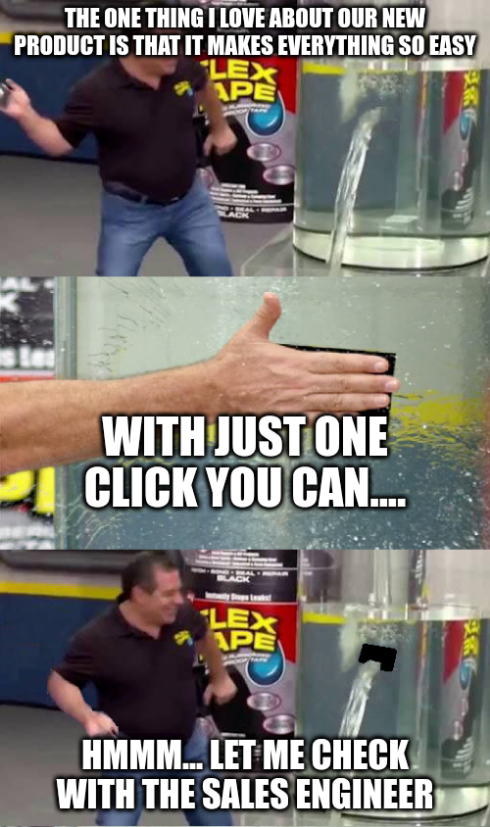
Limited Resources
It’s normal for 4+ sales reps to share a sales engineer. This means that the sales engineer’s time is more guarded than the sales rep’s time. This is really unfortunate when they’re the only ones that can answer our questions.
This also means that the sales engineer has less time for themselves. Sales engineers need to be in meetings, build BoM’s, and answer sales rep’s questions. With all those responsibilities they don’t have as much time to lab or get their hands on the product themselves. It’s very easy for them to get out of touch with the technology under these conditions.
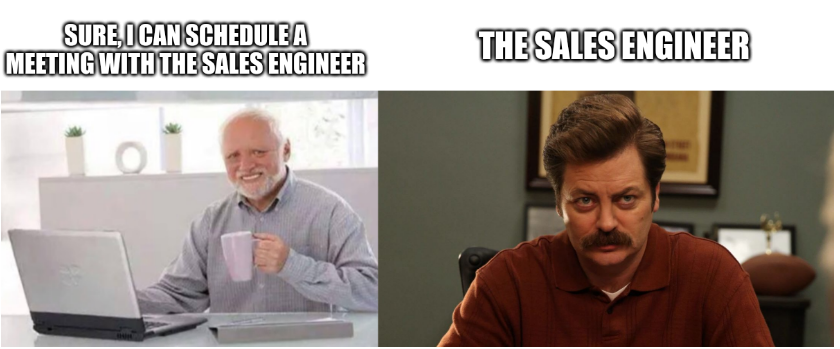
How Do They Close Deals?
So the question becomes, if these sales reps have limited time and resources, how do they meet these high quotas?
I’m not aware of any other strategies that work. The only one I could think of in this thought experiment that explains the behavior I’m seeing is this:
The strategy is to identify a set of problems that can be solved. Attempt to sell the solution to those problems to as many people as possible.
Instead of learning the ins and outs of everything it can do, it’s easier for the sales rep to focus on a few key points. They can learn that specific sales pitch or slide deck like a choreographed dance. Once they learn a pitch that will resonate with the majority of their audience, they simply repeat it as many times as possible to as many people they can reach to raise their chances of success.
From our perspective, this looks like a bunch of low effort correspondences that don’t exactly solve our problems or answer our questions.
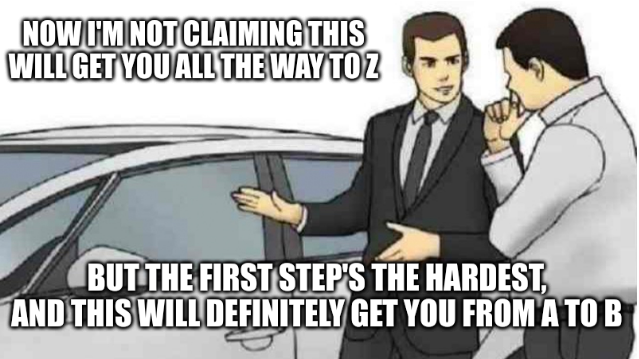
Engineer’s Point of View of Salespeople
Wasting Time
People in IT self-organize around who can best help them get the job done, not whoever is the most personable. This is because there’s a lot to do and a lot of problems to solve. They’ll gladly work with a jerk if that jerk is great at fixing issues.
The reverse is also true. Even if you’re the nicest person in the world, they couldn’t care less about you if you can’t troubleshoot your way out of wet paper bag.
With this in mind, your value to these engineers is based solely on how much you can help them. They’re probably talking to you because of one of two things:
- They need a question answered that isn’t answered on your company’s public documentation.
- They need to move forward with buying your product.
I’m pretty sure you know what to do if it’s #2. The first one is where most sales reps are just an impediment to the task on hand.

What Can be Done Differently?
Obviously as a company, you could encourage tenure, not push quotas, and provide more resources, but sales reps themselves have to look to other solutions as well. Here are some things ideas I’ve come up with for making change as an individual.
Take Time to Listen
Engineers usually have no shortage of things to complain about. The whole top half of this article was just me complaining, lol. Take time to listen to their problems and identify what parts of your solutions are relevant to their problems. They will gladly share all of their problems and complaints.
Take note of them, especially during the discovery call. These complaints are actually a series of needs that you can fill or mitigate to increase your likelihood of the sale going through.
Adjust Your Sales Pitch to Focus on Their Problems
If your sales pitch is focused on solving their problems instead of closing deals, engineers will clear their calendars to talk to you.
Focus on solving their problems and only their problems. Even if the features are something they could use, it’s still a waste of their time if it’s not solving the problems they have now.
As an example, let me tell you a story of being sold something potentially helpful that didn’t solve my immediate need:
I was very busy this day, but this software I wanted would solve a lot of the problems I have. I was working all day in a loud, hot data center and I wasn’t leaving until I finished what I was there to do. THe meeting was scheduled during a terribly inconvenient time. I made it a priority to attend this meeting because the vendor wouldn’t give me the trial key for the software until I met with them.
They then spent the next 45 minutes trying to upsell me on another solution. I was very upfront about being interested in the idea of this product, but I couldn’t even use it now if they gave it to me for free. I was up to my eyeballs in competing priorities. Instead of stopping there, they proceeded to make me sit through the whole slide deck. At the end, they asked me if I had any questions before giving me the trial license I needed in the first place.
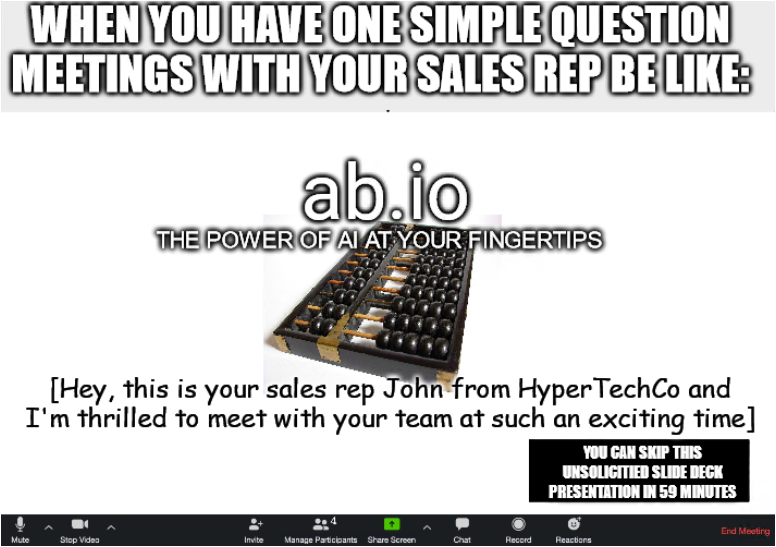
I forgot everything they told me about their products features and their slide deck. What I do remember is the frustration of having an already long day made longer.
Minimize Client Effort
The more investment you require the client to make to move the sale forward, the slower your sale will move. Ironically, the less time you require from the clients, the more time they’ll be willing to give you.
I’ve had reps that would call me multiple times a week to close a sale. It was great though. They’d ask quick questions and let me get back to my day after a short 5-15 minute call. Working with them was a pleasure and I looked forward to every time we talked because they weren’t draining my entire day.
On the other end of that, I’ve had reps that made me work for them to close the sale. I’ve had to fill out forms, then talk to the sales rep’s assistant to schedule a 30 minute sales call. I didn’t actually learn about the product during the initial sales call. We spent the first meeting qualifying myself as a good lead before I could talk to a sales rep about the product. I had to spread out my interactions with this vendor to limit how much time of each day it would consume. I also had to pace myself for my own sanity. If you don’t eat up all of your clients’ time, they won’t dread dealing with you, making your potential sale more likely.
Invest Time to Learn the Technical Details
You don’t need to fully become a sales engineer, but you do need to learn some nerd stuff if you want to be a better sales rep. Keep the 80/20 rule in mind. 20% of the knowledge can be learned to solve 80% of the questions. Pay attention to what common questions are being asked and try to gain a basic understanding of the technology under the hood. With even that minimal knowledge you can field a lot of the questions that normally need a sales engineer. The engineers will enjoy your presence a lot more for it, and your sales won’t constantly be waiting for a sales engineer to reply.
My favorite sales reps that I’ve talked to were the ones that answered enough technical questions to have me thinking they were a sales engineer for a minute. After being surprised at the depth of their answer to my basic questions, I would move onto the more technical ones and they would surprise me again by saying, “I’ll need to forward that to my sales engineer. I’m just a sales rep, so I only know the basic stuff.”

What Can Engineers Do to Improve This?
Being on the sales rep side has made me better at buying as well. Here’s some things I’ve learned that can help improve your buying process from the engineering side.
Don’t Be Afraid to Tell Your Sales Rep No
Sales reps don’t like taking no for an answer. It’s their job to sell, not to tell the company why their product isn’t a fit for the market. That being said, they do appreciate being told why their product isn’t a good fit for your company. Doing so also has the added benefit of getting them off your back more quickly if you’re not interested in buying from them. Don’t be surprised though if they come up with solutions to the reason why it’s not a fit for your company. If you were honest with your sales rep about it though, that should be a good thing now that you can buy something new that will solve some sort of problem you’re having.
How To Tell Them No
Engineers enjoy being very direct. You can actually do this with your sales rep if you take into account what their motives are.
They want to sell something. Their job is to find people with problems that their products solve. Once done, they need to help the company overcome all the barriers that are preventing them from buying. This could be getting executive buy-in, financing options, etc.
The reason they don’t take “No” for an answer is because they don’t believe you. A buyer saying no to a product that they need and should buy is about as common as a user lying to you about rebooting their computer before they called you. Just like a user calling into the help desk, we can expedite our sales process more quickly by providing evidence of our claim.

So after telling them no, I usually tell them either:
- Your product solves a problem I don’t have right now.
- I have this problem, and I’d like to buy your product to solve this, but these are the barriers preventing me from moving forward.
It’s important to be as honest and transparent with them as you can when telling them why you’re not able to move forward with the sale. If you give them some sort of lie, they may come back to you with a solution to your fake problem, wasting your time and theirs.
Examples of How I Tell Them No
Telling a sales rep that you don’t have the problem their product solves is pretty straightforward. Telling them why you can’t move forward with the sale even though you have a problem it solves can be a challenge. Here are some examples of me doing it to hopefully give you ideas of how to do so yourself.
One of my clients wanted me to get them a few quotes for data center colocations so that they could compare. Since I already had quotes and they knew what I was looking for, I had all 3 reps hounding me trying to make sure that theirs was the one that won the deal. To get them off my back, I talked to the client and figured out what their selection criteria was, and if there was anything each rep could do to win the sale.
For one of them I was able to do this without the client being involved at all. I simply let them know that the competing company had a better setup with more features we’re interested in. I let them know what specific features they were, and if they could provide those too, I’d be interested. Otherwise they were out of the running.
With the remaining two, I provided all the information I had on the selection criteria and let them do what they could to maximize their chance of success. Since they were satisfied they did everything they could to maximize their chance of success, there was no sense in engaging me further.
Benefits of Doing This
This may seem like I was being a doormat for our sales reps. It was actually quite the opposite. For everything I did for them to help them with their sale, I put them to work and they gave me a lot back. Since this was the first data center I had spec’d out from scratch, I had a lot of trouble figuring out how much power I needed and how to negotiate that with the sales reps. Instead, I dumped all the information I had and let them figure it out themselves. Since I was clear that there’s no way we’re going to buy a colocation space without having someone on our team that understands how to determine power requirements, their options were to either help me figure it out or wait for me to google my way through it. You already know which option they chose given how impatient sales reps can be.
It also adds a level of urgency to my requests. In another sale, I was clear to the sales rep that the one reason we’re looking at their product was to solve this specific problem. When I set up the demo, I had trouble using it to solve that problem in the 2 week trial that they gave me. I let the sales rep know the situation and that it’ll be hard to get sign off on buying this if I can’t get it to work. The sales rep in turn extended the trial and got me time with a sales engineer to help configure the system.
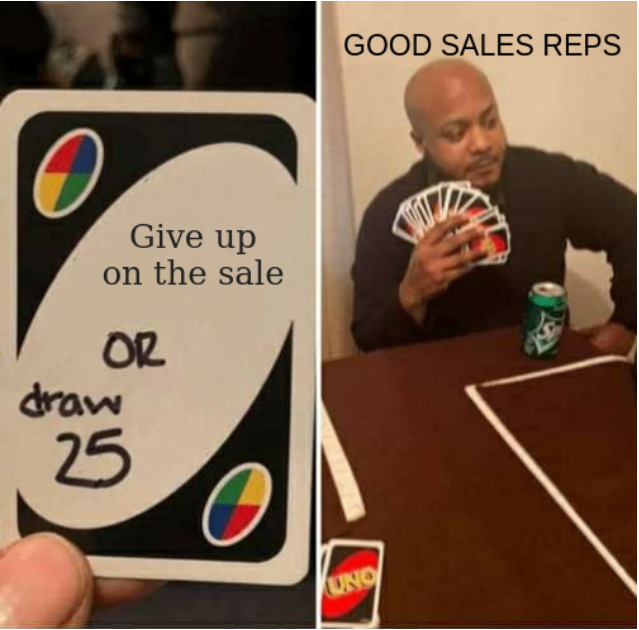
All of this can be a lot more work, but it’s the work of progress instead of sales reps just wasting your time.
Thank you for checking this out. I hope you learned something new or enjoyed reading this. If you had any comments, questions, or just wanted to share your thoughts on this article, you can contact me at blog@e-mayhem.com
e-Mayhem helps companies successfully deliver business projects. We also help companies avoid losses associated with IT disruptions and security threats. You can learn more about our services at e-mayhem.com or by emailing sales@e-mayhem.com


Comments are closed